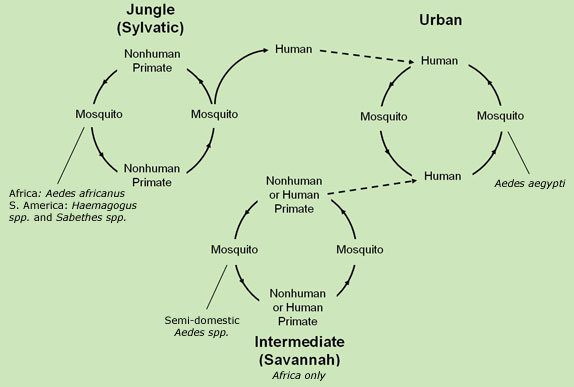Yellow fever is a vaccine treatable disease that spreads from mosquitoes to humans. It is called yellow fever due to the jaundiced skin that some patients who get the virus will experience.
The World Health Organization (WHO) only recommends the vaccine if you are older than nine months and travel to a country with outbreaks of yellow fever[1].
How can I protect against yellow fever?
Get the yellow fever vaccine
The best way to protect yourself from yellow fever is to vaccinate yourself when going to a country with endemic cases. Only one dose is required to get ideal coverage against yellow fever, and within 10 days, the vaccine has a protection rate of 80%, and within 30 days, it has a protection rate of 99%[7].
Protect from mosquito bites
Additionally, you should find ways to avoid getting bit by a mosquito. For example:
- Wearing long-sleeved shirts and pants.
- Ensuring you apply bug spray.
- Sleep in insecticide-treated beds with mosquito netting.
- Stay in a place with air conditioning to keep mosquitoes from getting into the house[8].
It is essential to seek care as soon as you suspect you have yellow fever as an earlier diagnosis can avoid further complications[8].
Where can I get the yellow fever vaccine in Hong Kong?
The yellow fever vaccination is a live attenuated vaccine, which means a weakened form of yellow fever is used to create the vaccine. It is administered in a singular dose and will give coverage for the rest of your life[9]. The side effects from taking the vaccine are minimal and relatively uncommon as only 5 - 10% of people experience them[10]. The side-effects of the vaccine are muscle aches, headache and low fever[11].
In Hong Kong, you can get the yellow fever vaccine at the travel health centres organised by the Department of Health. Travellers who are vaccinated will be given an International Certificate of Vaccination or Prophylaxis. The certificate is valid only 10 days after the primary injection.
Why is it important to take the yellow fever vaccine?
The yellow fever vaccine is vital as it can be life-threatening. Furthermore, the vaccine prevents travellers from introducing yellow fever into the mosquito populations in their home country. To meet these requirements, ensure you secure your vaccine booking in Hong Kong well in advance of your travel.
Yellow fever is also the only disease, except possibly COVID-19, requiring vaccination proof before travelling[10]. Speak to your doctor for more travel information about the yellow fever vaccine.
When should I get the yellow fever vaccine?
As previously mentioned, to enter some countries, a vaccine certificate may be required as per International Health Regulations. For the certificate to be valid, it needs to be at least 10 days old (to allow the vaccine time to become effective).
It’s recommended to speak to your doctor before travelling to see if you need a booster if you have already had the vaccine before[10].
It is also recommended that children 9 months or younger shall not get the vaccine, and adults older than 60 should consult with a doctor before taking the vaccine as they may be at greater risk of more severe side effects[10].
Where is yellow fever most common?
30 countries in Africa and 13 countries in Central to South American countries have endemic yellow fever[2]. Apart from an imported yellow fever case reported in Hong Kong in 1945, no imported case was documented in other Asian areas[3].
In 2005, epidemics of yellow fever were reported in Guinea, Mali and Sudan, accounting for 40% of all cases that year. Since 2005 there have been two other significant epidemics in the Ivory Coast and Togo[3].
People who have had yellow fever before are generally considered immune, which means chances that they get it again are very low[4].
What are the symptoms of yellow fever?
The incubation period for yellow fever is approximately 3 - 6 days. Most people will experience no symptoms, but mild symptoms that can occur include:- Fever
- Headache
- Vomiting
- Muscle pains and backaches
- Loss of appetite
- Increased light sensitivity
Yellow fever toxic stage
There is a ‘stage two’ that the illness can progress to, otherwise referred to as ‘the toxic stage’. This only occurs in between 15-25% of symptomatic yellow fever cases and has symptoms such as jaundice (hence the name yellow fever), kidney failure, abdominal pains, decreased heart rate, decreased urination and bleeding from the mouth, nose, eyes and stomach[5].
Yellow fever is a viral haemorrhagic fever, meaning it’s easy to rupture the blood vessels that could cause internal bleeding. The haemorrhaging happens in the toxic stage, and it is what gives yellow fever its lethality.
How is yellow fever transmitted?
People get infected by yellow fever through mosquitos. Particularly for yellow fever, there are 3 transmission cycles, ‘in the jungle’, ‘in the savannah’ and ‘in the city’. In the jungle, an infected mosquito will bite a monkey which will infect it with yellow fever. When that monkey is bit by a non-infected mosquito, the mosquito will then become a carrier of the virus and bite a non-infected monkey, and so on. In the savannah, where humans work near or in the jungle, the virus will be transmitted to humans from the monkey (via the mosquito). The final cycle, which is in the city, occurs when a human that became infected in the jungle or savannah returns and gets bit by mosquitos that live in the city. The virus is then transmitted from person to person through the intermediate mosquitos that live in the city and bite infected people[6].

(Source: CDC Transmission of Yellow Fever Virus)
There is no evidence of yellow fever spreading through person to person contact.
References
- Centers for Disease Control and Prevention. (2021). ‘Yellow Fever Vaccine Recommendations’. CDC. 21 April 2021. Available at: <https://www.cdc.gov/yellowfever/vaccine/vaccine-recommendations.html> [Accessed 7 October 2021].
- HealthyWA. ‘Yellow Fever’. Government of Western Australia Department of Health. Available at: <https://www.healthywa.wa.gov.au/Articles/U_Z/Yellow-fever> [Accessed 7 October 2021].
- Scientific Comittee on Vector-borne Diseases. (2008). ‘Prevention of Yellow Fever in Hong Kong’. Centre for Health Protection. April 2008. Available at: <https://www.chp.gov.hk/files/pdf/prevention_of_yellow_fever_in_hong_kong_r.pdf> [Accessed 7 October 2021].
- Brazier, Y. (2017). ‘What's to know about yellow fever?’. Medical News Today. 17 May 2021. Available at: <https://www.medicalnewstoday.com/articles/174372> [Accessed 7 October 2021].
- National Health Service. (2020). ‘Yellow Fever’. NHS. 22 May 2020. Available at: <https://www.nhs.uk/conditions/yellow-fever/> [Accessed 7 October 2021].
- Centers for Disease Control and Prevention. (2019). ‘Yellow Fever Transmission’. CDC. 15 January 2019. Available at: <https://www.cdc.gov/yellowfever/transmission/index.html> [Accessed 7 October 2021].
- World Health Organization. (2019). ‘Yellow Fever’. WHO. 7 May 2019. Available at: <https://www.who.int/en/news-room/fact-sheets/detail/yellow-fever> [Accessed 7 October 2021].
- May Clinic. (2020). ‘Yellow Fever’. Mayo Clinic. 22 September 2020. Available at: <https://www.mayoclinic.org/diseases-conditions/yellow-fever/symptoms-causes/syc-20353045> [Accessed 7 October 2021].
- Centers for Disease Control and Prevention. (2021). ‘Yellow Fever Vaccine’. CDC. 21 April 2021. Available at: <https://www.cdc.gov/yellowfever/vaccine/index.html> [Accessed 7 October 2021].
- Travel Health Service. (2021). ‘Yellow Fever Vaccination’. Department of Health. 20 September 2021. Available at: <https://www.travelhealth.gov.hk/english/vaccine_prophylaxis/yellowfever.html> [Accessed 7 October 2021].
- Centers for Disease Control and Prevention. (2019). ‘Reactions to Yellow Fever Vaccine’. CDC. 15 January 2019. Available at: <https://www.cdc.gov/yellowfever/vaccine/vaccine-reactions.html> [Accessed 7 October 2021].
 Central General Practice
Central General Practice
 Repulse Bay
Repulse Bay
 Clearwater Bay
Clearwater Bay
 BodyWorX Clinic
BodyWorX Clinic
 Central Specialist Clinic
Central Specialist Clinic
 MindWorX Clinic
MindWorX Clinic
 Partner Clinics
Partner Clinics
 Family Clinic
Family Clinic
 OT&P Annerley Midwives Clinic
OT&P Annerley Midwives Clinic
 WellWorX Clinic
WellWorX Clinic





